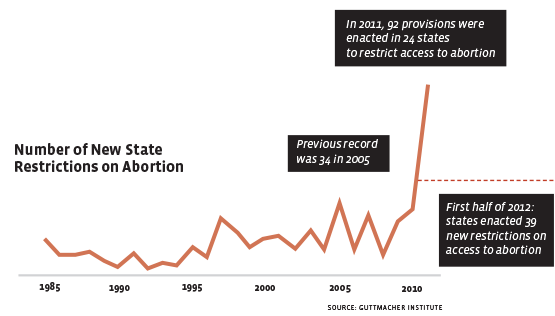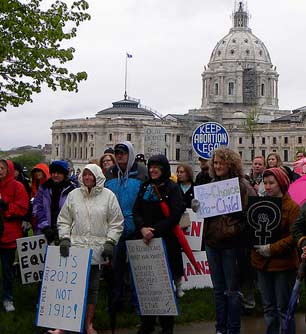National polls show that most of the public supports birth control and abortion rights. So what’s with the trend of trying to limit them?
More than 1,100 bills aiming to restrict reproductive health access were introduced in state legislatures in 2011. By the end of the year, 135 of these measures were enacted in 35 states. The trend continued in the first half of 2012, with legislatures passing 95 new provisions related to birth control and abortion. But supporters of reproductive rights are pushing back.
When a “personhood amendment” that would grant human rights to a fertilized egg was put on the ballot last November in Mississippi—a Bible Belt state with a legacy of entrenched conservatism—pro-choice activists knew they faced an uphill battle against an initiative that would undercut access to safe and legal abortion and outlaw many forms of birth control, the morning-after pill, and in-vitro fertilization.
Mississippians for Healthy Families, aided by students, civil rights activists, and faith leaders, organized successfully to defeat the bill, winning 58 percent of the vote. It is difficult, if not impossible, for women and medical professionals to pinpoint the exact moment an ovum is fertilized, so the new law would have been impossible to follow consistently. Had it passed, it would have necessitated a Supreme Court challenge, and thus an opportunity to reverse Roe v. Wade, the 1973 ruling that legalized abortion.
But Mississippi was just one battle in what many call “the war on women”—an assault on reproductive rights through bills to outlaw abortion, limit access to birth control, and eliminate funding for women’s health programs. The bills, all spearheaded by Republican legislators, are backed by the religious right and powerful lobbies. Prominent in recent campaigns to limit or deny abortion and birth control were the the National Right to Life Committee and the U.S. Conference of Catholic Bishops.
When Virginia passed its “ultrasound bill” in March that requires women to undergo a transvaginal or abdominal ultrasound before having an abortion, Idaho tried to follow suit. Though the measure passed the Idaho Senate, a House committee chairman prevented the bill from reaching the floor for a vote, citing concerns over conflicts with a pre-existing informed consent law.
National polls show that most of the public supports abortion rights, at least in some cases. Even in Virginia’s 7th Congressional District, home to Republican House Majority Leader Eric Cantor and one of the most consistently conservative districts in the United States, 68 percent of voters say they would support a pro-choice candidate over an anti-choice candidate, according to a Harrison Hickman poll.

Join us in defending the truth before it’s too late
The future of independent journalism is uncertain, and the consequences of losing it are too grave to ignore. To ensure Truthout remains safe, strong, and free, we need to raise $47,000 in the next 8 days. Every dollar raised goes directly toward the costs of producing news you can trust.
Please give what you can — because by supporting us with a tax-deductible donation, you’re not just preserving a source of news, you’re helping to safeguard what’s left of our democracy.
